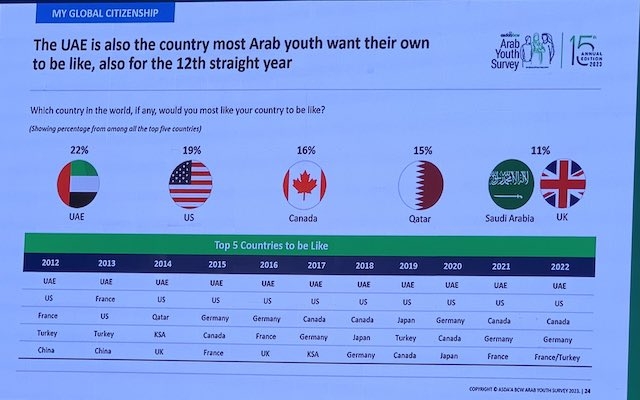A new and particularly extensive survey by an Emirati Institute examined the attitudes of the younger generation in Arab countries regarding normalization with Israel. As expected, the majority of young people, between the ages of 18-24, in Arab countries oppose the normalization of relations with Israel, but surprising figures are revealed in the differences between the Arab nations.
When the young people were asked if they support or will support their government's decision to normalize diplomatic relations with Israel, 75% of Emiratis supported it but only a third of Bahrainis supported it. It should be noted that in Bahrain, a Shiite majority lives under the control of a Sunni minority. Another result that should be noted is that in Sudan, which is in the midst of an internal military conflict, 94% of young people oppose the establishment of official diplomatic relations with Israel. A move that has not yet been fully completed. Conversely, in South Sudan, 47% support strengthening relations.
Majority of Arab Youth in UAE, Egypt and Morocco Strongly Support Normalization with Israel, New Poll Shows - UAE Times https://t.co/mhV37BrGCB
— Abraham Accords Peace Institute (@Peace_Accords) June 22, 2023
Saudi Arabia has been talked about a lot in recent years when it comes to establishing diplomatic relations with Israel and it is considered the jewel in the crown of normalization. These stats that will probably interest Saudi Crown Prince Mohammed Bin Salman indicate that 98% of young Saudis oppose normalization, and only 2% support it. It is important to note here that most of those polled in Saudi Arabia were educated under a strictly anti-Israel system where the Wahabist ideology that dominated Saudi Arabia for decades ruled over a majority. Since King Salman's reign began, however, much reform to the system has taken place, and the Saudi education model more closely resembles that of the United Arab Emirates. It is also said that where the King's son, Muhammad Bin Salman who has led many of the recent reforms to Saudi society leads, the people will follow.
This year’s Arab Youth Survey, the 15th, polled 3,600 individuals aged 18 to 24 in 18 countries and 53 cities in the Middle East & North Africa. 75% of young Arabs in the UAE, 73% in Egypt and 50% in Morocco “strongly support” or “somewhat support” relations with Israel. https://t.co/AX5REDTePE
— Robert Greenway (@RC_Greenway) June 22, 2023
Just recently there was an attack on the border of Egypt, in which three Israel Defense Forces soldiers were killed; the harsh incident re-flooded the question of relations between the nations in light of the hostility towards Israel. Against this background, the young Egyptians in the survey expressed a high rate of support, 73%, for relations with Israel. In Morocco, most of those respondents support the normalization of relations, with 50% in favor compared to 44% opposed, and the rest of the respondents “not sure.”
83% of poll respondents said Israel, with a population of nearly 2,000,000 Arab citizens, should be invited to join the Arab League as either a full member or observer. Let's do it. pic.twitter.com/CrA06LKSWx
— Avi Kaner ابراهيم אבי (@AviKaner) June 24, 2021
Furthermore, in Jordan, with which Israel has maintained a peace agreement for about three decades, there is a great deal of opposition to diplomatic relations. No less than 94% of Jordanian youth oppose official relations with their neighbor to the West. In Jordan, it should be noted, there is a large majority of those who consider themselves Palestinians. Like Bahrain, the majority Palestinian population is ruled by a Hashemite minority. In the past, the Palestine Liberation Organization has tried to stage a coup, and in 1951 a Palestinian from the Al-Husseini family assassinated King Abdullah I bin Al-Hussein in front of the Al Aqsa mosque in Jerusalem. Other data from the survey shows that in Oman 39% support ties with Israel compared to 61% who are opposed. In Algeria, there is support for normalization at a rate of 31%.
(…) The ASDA’A BCW #ArabYouthSurvey:
— Mazen HAYEK (@HayekMG) June 20, 2023
Most Arab youth oppose normalisation of ties with #Israel, but those in the #UAE, #Egypt and #Morocco strongly support it.#AYS #Survey #Dubai pic.twitter.com/FaDJh9z6Hb
The survey was conducted between March 27 and April 12, 2023, and included personal interviews with 3,600 young people between the ages of 18 and 24. This segment of the population in the Middle East included more than 200 million people. The sample was divided equally between young men and women from 18 Arab countries, including South Sudan.


